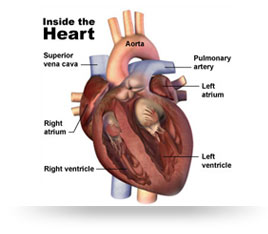
Mitral regurgitation (MR), which is also known as mitral insufficiency, is a common heart valve disorder. When mitral regurgitation is present, blood flows backwards through the mitral valve when the heart contracts. This reduces the amount of blood that is pumped out to the body.
Mitral regurgitation — When mitral regurgitation (MR) is present, blood leaks backwards through the mitral valve and into the left atrium when the heart contracts. This means that less blood is pumped out of the heart to supply the body. If the amount of MR is small and does not progress, the backward leak has no significant consequences.
If significant (moderate to severe) regurgitation is present, the left ventricle must work harder to keep up with the body's demands for oxygenated blood. Over time, the heart muscle (the myocardium) and circulatory system undergo a series of changes to maintain this increased demand. These changes generally occur in phases over many years, even decades, depending upon the amount of blood that is regurgitated and how the heart responds to the regurgitated blood. The cause of mitral regurgitation also determines how quickly the heart begins to fail.
Compensated phase — The major change during this phase is enlargement of the left ventricle. This is known as the compensated phase, which does not usually cause symptoms, the heart rhythm is usually normal, and surgical treatment is generally not required.
Transitional phase — As mitral regurgitation progresses, the heart muscle (myocardium) begins to fail because the ventricle can no longer compensate for the regurgitation. This phase is called the transitional phase. The reason that you might progress from the compensated to the transitional phase is not completely clear, although changes in heart or heart pumping function may occur as progressively greater volumes of blood are regurgitated and/or the size of the left ventricle increases.
You may experience fatigue, have a decreased ability to exercise or be active, or feel short of breath in the transitional phase. However, some people have no symptoms. Surgical treatment is usually recommended when you enter the transitional phase.
Decompensated phase — As the left ventricle enlarges and functions less efficiently, the left atrium progressively enlarges, abnormal heart rhythms occur, and the blood pressure in the pulmonary artery (the blood vessel from the heart to the lungs) increases; this is called pulmonary hypertension. Over time, these changes become irreversible as the signs and symptoms of heart failure develop.
MITRAL REGURGITATION CAUSES
A trivial amount of mitral regurgitation is present in up to 70 percent of adults. Significant (moderate to severe) mitral regurgitation is much less common. For example, moderate or severe mitral regurgitation was found in only about 2 percent of people in one study [1]. Significant mitral regurgitation can develop as a result of an abnormality in a heart valve or another cardiac disease, including the following:
- Mitral valve prolapse — Mitral valve prolapse occurs when the mitral valve leaflet tissue is deformed and elongated so that the leaflets do not come together normally. This abnormal valve motion may allow blood to leak backwards from the left ventricle into the left atrium. Although most people with mitral valve prolapse have only trace or mild mitral regurgitation, some develop significant mitral regurgitation.
- Infective endocarditis — Infective endocarditis (IE) is an infection of the heart valves caused by bacteria, fungi, or other organisms that invade the bloodstream. As the microorganisms adhere to the valves and grow, abnormal structures (known as vegetations) develop on the heart valves. The vegetation can prevent the mitral valve from closing normally, allowing blood to regurgitate. A heart valve that is already abnormal is more likely to develop endocarditis compared to a valve that is normal.
- Rheumatic fever — Rheumatic fever is a body-wide illness that occurs when the bacterium that causes Strep throat (group A Streptococcus) is not treated. Rheumatic fever causes inflammation of the valves of the heart, as well as other complications. Rheumatic fever is now uncommon in developed countries, although it still occurs commonly in developing countries.
- Congenital heart abnormality — Children who are born with certain types of heart abnormalities can develop mitral regurgitation.
- Other types of heart disease — Mitral regurgitation can develop as a result of other types of heart diseases, such as after a heart attack or other cause of heart muscle injury.
- Trauma — Chest trauma can rarely cause breakage of the chords that hold the mitral leaflets in their normal position. Untethered leaflets swing widely, allowing valve leakage

